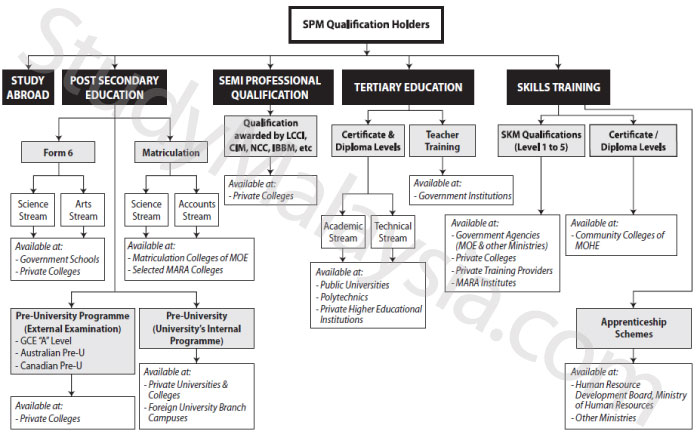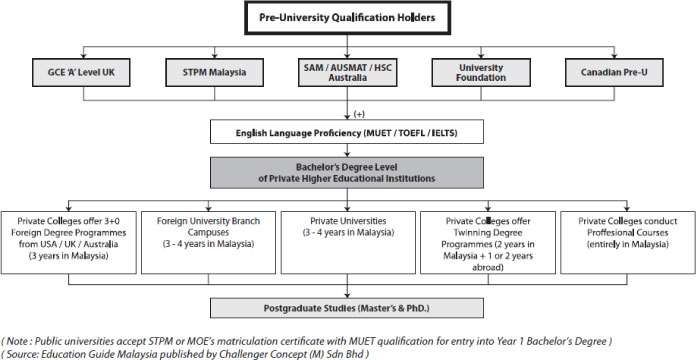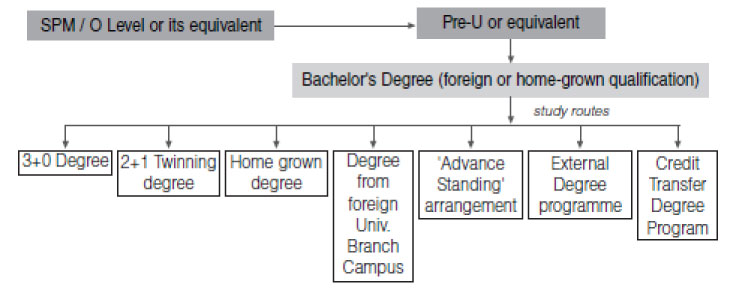Study Opportunities at Private Higher Educational Institutions (PHEIs)
by StudyMalaysia.com on March 7, 2015 | Private Education Routes

Introduction
Private Higher Educational Institutions (PHEIs) (also known as Institut Pengajian Tinggi Swasta (IPTS)) play an important role alongside public universities in the provision of tertiary education in Malaysia.
Although PHEIs are fully-funded by the private sector, they fall under the jurisdiction of the Ministry of Higher Education (MOHE) and are governed by various legislation to ensure the provision of quality education. The legislation include:
- The Private Higher Education Institutions Act 1996
- The National Council of Higher Education Act 1996
- The Malaysian Qualifications Agency Act 2007
- The National Higher Education Fund Corporation Act, 1997 (Amendment 2000)
- The Private Higher Educational Institutions (Amendment) Act 2009
The majority of PHEIs use English as the medium of instruction for their courses. Besides offering education opportunities to Malaysian students, these institutions have also become a very popular choice among many international students.
At the beginning of 2011, there were 452 PHEIs approved by MOHE and are categorised as below:
| Number of PHEIs as at Dec 2010 | |
|---|---|
| Categories of PHEIs | Number |
| - University - University College - Foreign University Branch Campus |
23 21 5 |
| Non-university status | 403 |
| TOTAL | 452 |
Source: jpt.moe.gov.my
| Student Enrolment as at Dec 2010 | |||||||
|---|---|---|---|---|---|---|---|
| Type of PHEI | Student Enrolment | ||||||
| Malaysian | International | Total | |||||
| Private Universities | 193,086 | 15,859 | 208,945 | ||||
| Foreign University Branch Campuses | 13,280 | 3,730 | 17,010 | ||||
| University Colleges | 77,343 | 16,295 | 93,638 | ||||
| Non-university status institutions (e.g. private colleges and institutes) | 195,215 | 26,821 | 222,036 | ||||
| Grand Total | 478,924 | 62,705 | 541,629 | ||||
The five foreign university branch campuses in Malaysia offer internationally-recognised foreign degree qualifications whilst the 44 private universities and university colleges offer home-grown degree programmes and 3+0 foreign university degree programmes.
There are some 35 non-university status PHEIs (i.e. private colleges) that conduct 3+0 foreign university degree programmes in collaboration with overseas host universities besides awarding their own certificate and diploma level qualifications to students. Many of these PHEIs also have twinning degree arrangements (commonly known as 2+1) with reputable foreign universities all over the world.
At the beginning of 2011, there were more than 541,629 students studying in PHEIs and about 58,294 (approximately 10% of the total) were international students pursuing tertiary programmes and English language courses.
Malaysia's private higher education is unique and renowned because it offers students a wide variety of study options and a choice of both local and foreign university qualifications of international standing to suit individual preferences.
ABOUT PHEIs
MOHE Approvals and Other Requirements
Private higher educational institutions (PHEIs) which offer tertiary education must be approved by the Ministry of Higher Education (MOHE) to operate as required by Malaysian laws.
In addition to obtaining the approval to operate, the courses offered by PHEIs leading to the award of certificate, diploma and degree qualifications need to be recognised by the Malaysian Qualifications Agency (MQA) through two distinct processes i.e. provisional accreditation and accreditation which assures the quality of these courses. Without MQA's accreditation, any qualification awarded to students by PHEIs is considered a breach of Malaysian education law. Therefore, it is advisable for students to ensure that the course they intend to enrol for is endorsed by MQA. For a list of approved PHEIs and accredited courses, click on the Malaysian Qualifications Register at www.mqa.gov.my.
An important point to note is that not all PHEIs in Malaysia, although approved by MOHE, are allowed to enrol international students. In order to do so, PHEIs require an additional licence or approval from the Ministry of Home Affairs Malaysia (Immigration Department).
Categories of PHEIs
PHEIs consist of the following categories:- Non-university status institutions, i.e.
- Private colleges
- Private institutions - University status institutions, i.e.
- Private universities
- Private university colleges
- Foreign university branch campuses
Types of Qualifications Awarded
PHEIs conduct a wide range of courses and award qualifications ranging from certificate, diploma, degree to doctoral qualifications:
- Private Colleges
- Pre-university programmes (internal and external qualifications)
- Internal or self-designed certificate and diploma qualifications
- Foreign university degree programmes in collaboration with partner-universities
- External professional and semi-professional examinations - Private Universities and University Colleges
- University foundation courses
- Internal diploma and degree qualifications as well as foreign university degrees
programmes in collaboration with partner-universities - Branch Campuses of Foreign Universities
- Degree qualifications identical to that of the foreign university
PHEIs play a significant role in fulfilling the needs of tertiary education for many local and international students. The courses offered are open to Malaysian and international students that possess SPM / Senior Middle III / STPM / GCE O Levels / STPM / GCE A-Levels or other equivalent qualifications. Students can also select either full-time or part-time study, or the distance learning mode in obtaining their qualification affordably.
Admission Requirements
PHEIs will require some basic academic qualifications from applicants before considering their applications for the respective study programmes. The general entry requirement to pursue diploma programmes is SPM or GCE O Level with a minimum of 3 credits, whereas students with STPM qualifications or its equivalent such as GCE A Levels, University Foundation Programme, SAM, and CPU are allowed to enter Year 1 of an undergraduate programme.
| General Entry Requirements for Pre-University / Diploma / Degree Programmes | |
|---|---|
| Education Level | General Entry Requirement |
| University Foundation Programme | SPM/GSCE O Level with 5 credits, or its equivalent |
| Certificate Level | SPM/ GSCE O Level with 1 credit, or its equivalent |
| Diploma Level | SPM/ GSCE O Level with 3 credits, or its equivalent |
| Year 1 of Bachelor’s Degree | STPM /GCE A Level + English Proficiency or its equivalent |
English Proficiency Requirement
Proficiency in the English language is another requirement by PHEIs. Students are expected to have adequate knowledge and understanding of English, as this is the language of instruction at private colleges and universities. Various international examinations such as GCE 1119, MUET (Malaysia University English Test), TOEFL and IELTS are generally accepted for bachelor's degree programmes.
| Accepted Scores of English Proficiency Standard | |
|---|---|
| English Proficiency Test | Accepted Scores for First Degree Programmes |
| TOEFL | 173 to 250 on a new computer administered test (equivalent to a score of 500 to 600 on the old paper-based test format) |
| IELTS | 6.0 to 7.0 |
| MUET | SPM/ GSCE O Level with 3 credits, or its equivalent |
Application Procedures
Students with SPM / Senior Middle III / STPM / GCE 'O' Levels / GCE 'A' Levels or other equivalent qualifications must APPLY DIRECTLY to the institutions concerned. Unlike the enrolment into public universities at the diploma and bachelor's degree levels, there is no centralised enrolment agency that governs the intake of students into private institutions.
For any online enquiry on education opportunities in Malaysia, email us here your enquiry.
Higher Education Qualification Levels under MQA
Under the Malaysian Qualifications Agency (MQA), the levels of higher education qualification detailed in the Malaysian Qualification Framework (MQF) include:
- Levels 1 to 3 - These include skill certificates awarded by skill training institutes; vocational and technical certificates awarded by Community Colleges and Polytechnics; as well as certificates (Level 3 only) awarded by the Higher Education sector.
- Levels 4 and 5 - These levels include diplomas and advanced diplomas (general degree) respectively, awarded by the Technical and Vocational sector, the Skills sector as well as the Higher Education sector.
- Levels 6 to 8 - Level 6 is generally first degrees, i.e. bachelor degrees with honours while Level 7 is for master degrees and Level 8 for PhD / doctoral degrees. Under the lifelong learning category, there are graduate certificates and diplomas as well as postgraduate certificates and diplomas.
The framework specifies that a programme is required to achieve the following minimum credits before an academic qualification can be awarded, e.g. certificate (60 credits), diploma (90 credits), bachelor degree (120 credits) and taught master's degree (40 credits). Master's degrees and PhD obtained by research do not have credit values.
The various levels of higher education qualifications based on the MQF can be defined as follows:
| Malaysian Higher Education Qualification Levels and Minimum Number of Credits Required | ||
|---|---|---|
| Education levels | Higher education qualification | Minimum credit required for the award of qualification |
| 8 | Doctoral | No given credit value |
| 7 | Research master’s |
No given credit value |
| Fully or partly taught master’s | 40 | |
| Postgraduate diploma | 30 | |
| Postgraduate certificate | 20 | |
| 6 | Bachelor’s degree | 120 |
| Graduate diploma | 60 | |
| Graduate certificate | 30 | |
| 5 | Advanced diploma | 40 |
| 4 | Diploma | 90 |
| 1-3 | Certificate | 60 |
| Skills certificate | According to the skill and levels | |
Source: MQA
Pathways to Tertiary Education - An Overview
The table below shows the study pathways at tertiary level for students with SPM and STPM qualifications or its equivalent.
Study Pathway for SPM and STPM Qualification Holders or its Equivalent


Graphic by Challenger Concept
Study Opportunities
1. Studying at PHEIs for pre-university programmes
Pre-university programmes in Malaysia can be grouped into three categories:
- International pre-university qualifications by an external Examining Board
- A university's internal foundation programme
- Malaysian post-secondary qualifications by the Malaysian Examination Board
| Examples of Pre-university Programmes offered by PHEIs | |
|---|---|
| Pre-University Qualification | Qualification Awarded by Examination Body from Country of Origin |
| Sijil Tinggi Persekolahan Malaysia (STPM) | Malaysia |
| Matriculation Certificate, Ministry of Education Malaysia | Malaysia |
| University of Cambridge International Examinations (CIE) for A and AS Levels | UK |
| Edexcel International for London Examinations Board GCE A Levels | UK |
| South Australian Matriculation (SAM) | Australia |
| Western Australian Matriculation (AUSMAT) | Australia |
| New South Wales High School Certificate | Australia |
| Canadian Pre-University Programme (CPU) | Canada |
| International Baccalaureate Diploma Programme | International Board |
| Universities’ Internal Degree Foundation Courses | Depends on the university’s country of original |
There are many choices of pre-university qualifications for students to choose from that are awarded by examining boards from the UK, Australia or Canada. Each pre-university qualification has its own assessment method and duration of study. The table below indicates their differences.
| A Comparison (Assessment Method & duration) between Various Types of Pre-university Programmes | ||
|---|---|---|
| Types of Pre-Universities | Assessment Method | Duration |
| STPM, Malaysia | 100% External Exam | 18 months |
| Matriculation Certificate, Ministry of Education Malaysia | 100% Internal Assessment & Final Exam |
12 months |
| SAM, Australia | 50% Internal Assessment 50% External |
10 months |
| AUSMAT, Australia | 50% Internal Assessment 50% External Exam |
10 months |
| CPU, Canada | Australia | 12 months |
| IB, International | 30% Internal Assessment 70% External Exam |
24 months |
| A-Levels, UK | 100% External Exam | 15-18 months |
| University’s Internal Programme | 100% Internal Assessment & Final Exam |
12 months |
Source: StudyMalaysia Research Team
Pre-Tertiary Education - Admission Requirements
The table below indicates examples of admission requirements for Malaysian and international students (English competency is required).
| Some Examples of Entry Requirements for Pre-Tertiary Education | |
|---|---|
| Student's Country of Origin | Academic Qualification and Minimum Admission Requirements for Pre-University Programmes |
| Malaysia | Sijil Pelajaran Malaysia, SPM (Malaysian Certificate of Education equivalent to 'O' Level) - 5 credits (including English) |
| Australia | Completion of Senior Secondary School or equivalent (Year 11) |
| Brunei | GCE (Ordinary Level) - Credit in 4 relevant subjects and English competency |
| Bangladesh |
|
| P.R.China | Complete Senior Middle 2 (Year 11) |
| Fiji and Pacific Islands | Fiji School Leaving Cert - aggregate of 230 for best 4 subjects |
| Hong Kong | HKCEE - Grade D in 4 subjects |
| Cambodia | Upper Secondary School Certificate (Baccalaureate) - pass with satisfactory grades in relevant subjects |
| India | Completion of the All India Secondary School Certificate awarded by The Central Board of Secondary Education (CBSE) with an average of 60% in four subjects, one of which must be English (with 60% or better) or with separate evidence of competence in English or GCE 'O' Level - credit in 4 relevant academic subjects and English competency |
| Indonesia | Sekolah Menengah Umum 2 (SMU 2) - A minimum average grade of 7.5 Or SMU 3 - average grade 7.0 |
| Iran | National High Secondary School Diploma / Secondary School Diploma - pass with satisfactory grades in relevant subjects |
| Japan | Upper Secondary School Leaving Certificate - grade C in 5 subjects |
| Maldives | GCE (Ordinary Level) - A minimum of 5 credits |
| Mauritius | GCE (Ordinary Level) - A minimum of 5 credits |
| Myanmar | Basic Education High School Certificate (BEHS) (e.g. Matriculation) - Minimum average grade of 60% or better for all subjects |
| Nepal | Higher Secondary Certificate - 1st Division |
| Oman | Thanawiya Amma (Secondary School Leaving Certificate) - pass with satisfactory grades in relevant subjects |
| Pakistan | Completion of the Secondary School Certificate awarded by The Federal Board of Intermediate and Secondary Education from Pakistan with an average of 60% in four (4) academic subjects, and at least 60% in English or GCE 'O' Level - credit in 4 relevant academic subjects and English competency |
| Philippines | High School Diploma - with pass in University Admission |
| Saudi Arabia | General Secondary Education Certificate |
| Singapore | GCE 'O' Level - credit in 4 relevant subjects and English competency |
| South Africa | South Africa Senior Certificate - pass with satisfactory grades in relevant subjects |
| Republic of Korea | Senior High School Leaving Cert - grade C in 5 subjects |
| Macau | HKCEE - grade D in 4 subjects |
| Sri Lanka | GCE 'O' Level - credit in 4 relevant subjects and English competency |
| Taiwan | High School Leaving Cert - grade C in 5 subjects |
| Thailand | Matayom 6 - grade 2.5 or above in relevant subjects Matayom 6 - grade 3.0 or above in relevant vocational subjects |
| United Arab Emirates | General Secondary Education Certificate |
| Vietnam | Year 12 - grade 7.0 average or Year 11 - grade 7.5 average |
| Yemen | Al-Thanawiya (General Secondary Education Certificate) - pass with satisfactory grades in relevant subjects |
Source: Prospectus of Taylor's College and Curtin University Sarawak Campus Malaysia
(Please note that the minimum academic requirements stated here is merely a guide. Students are advised to contact the individual institutions for enrolment requirements as well as other terms and conditions.)
The Cost of Pre-University Education
Besides the tuition fees for any university programme, students also need to pay for others fees which include registration fee, deposit, computer/science laboratory fees, library fees and other incidental costs. Other expenses to consider are expenses for food, transport, stationery, accommodation, etc.
Many international students make Malaysia their destination when pursuing their education as Malaysia offers a wonderful lifestyle and relatively low tuition fees. The table below shows the breakdown of tuition fees for pre-university and foundation programmes.
| Estimated Tuition Fees for University Foundation or Pre-University Studies at PHEIs | ||
|---|---|---|
| Pre-University Studies | Estimated Tuition Fee | Duration |
| External Qualifications | ||
| GCE 'A' Level, UK | RM15,000 - RM25,000 (USD4,690 - USD7,810) |
15-18 months |
| Western Australian Matriculation (AUSMAT), Australia | RM11,000 - RM21,000 (USD3,440 – USD6,560) |
10 months |
| South Australian Matriculation (SAM), Australia | RM21,000 - RM25,000 (USD6,560 - USD7,810) |
10 months |
| Canadian Pre-U, Canada | RM19,000 - RM29,000 (USD5,940 - USD9,060) |
12 months |
| University of New South Wales (UNSW) Foundation Year | RM14,000 - RM23,000 USD4,375 - USD7,190) |
12 months |
| International Baccalaureate Diploma | RM79,000.00 (USD9,062) |
24 months |
| Internal Qualifications | ||
| University Foundation Studies/Matriculation | RM9,000 - RM15,000 (USD2,810 - USD4,690) |
10 - 12 months |
Note: All figures are estimates and only a guideline
Source: StudyMalaysia Research Team & Study in Malaysia Handbook (8th International Edition)
Currency Conversion Rate: USD1=RM3.20, 1A$=RM3.00, 1£=RM4.80
2. Studying at PHEIs for Internally Developed Certificate and Diploma Qualifications
Private colleges are the main providers of certificate and diploma level programmes even though some private universities also offer such programmes at these levels. These institutions develop and award their own certificate and diploma level qualifications to students.
The general entry requirement of these programmes is SPM or its equivalent. The greatest strength of internally-developed diploma level programmes offered by PHEIs is that they are recognised and granted with 'advance standing' entry status by many of the local private universities and foreign universities in Australia, Canada, New Zealand, the UK, Germany, China, Taiwan and the USA, for their entry into these universities' bachelor degree programmes. The other plus factor is that the course is conducted in English, an international language used by many communities and countries globally.
The PHEIs' unique and long established inter-institutional collaborative arrangements with foreign partner-universities have created pathways for students to acquire foreign university degree qualifications in a much more cost-effective manner. Thousands of diploma graduates have gone to foreign universities to finish the final part of their bachelor degree programmes, although there are also many who choose to remain in Malaysia to complete their degrees.
The curriculum and examination of this programme are set by the local private colleges, following the quality criteria set by the Ministry of Higher Education and quality assurance agency, Malaysian Qualifications Agency (MQA) and validated or moderated by their foreign collaborative university partners. Students can study either full-time or part-time at the premises of the private college.
Entry Requirements for Students Seeking to Pursue Certificate / Diploma-level Programmes
The table below provides an overview of the general entry requirements for certificate as well as diploma-level programmes offered by private colleges in Malaysia.
| General Entry Requirements for Certificate and Diploma-level Programmes | |
|---|---|
| Education Level | General Entry Requirement |
| Certificate Level | SPM / GSCE O Level with one credit, or its equivalent |
| Diploma Level | SPM / GSCE O Level with three credits, or its equivalent |
| Brunei | GCE (Ordinary Level) - Credit in 4 relevant subjects and English competency |
3. Studying at PHEIs for bachelor degrees and other professional qualifications
Types of Bachelor Degree Programmes in Malaysia
Private higher educational institutions (PHEIs) provide a wide spectrum of study options for students intending to pursue bachelor degree programmes in Malaysia. They are:
1. Foreign university branch campuses located in Malaysia.
These universities offer identical degrees to those at the main campus overseas. Students studying at the Malaysian campus will be awarded the same qualifications as that of their foreign counterpart.
| Foreign University Branch Campuses in Malaysia | |
|---|---|
| Name of Branch Campus and year established in Malaysia | Country of Origin |
| Monash University Malaysia, 1998 | Australia |
| Curtin University Sarawak Campus, Malaysia, 1999 | Australia |
| The University of Nottingham Malaysia Campus, 2000 | UK |
| Swinburne University of Technology Sarawak Campus, 2004 | Australia |
| Newcastle University Medicine Malaysia, 2009 | UK |
Cost of Study
| Estimated Tuition Fees per Course for Bachelor's Degree at Foreign University Branch Campuses located in Malaysia | ||
|---|---|---|
| Areas of Study | Estimated Tuition Fee | Duration of Study |
| Business | RM50,000 – RM85,000 (USD15,600 – USD26,500) |
3 years |
| Engineering | RM69,000 – RM115,000 (USD21,500 – USD36,000) |
(4 yrs for Aust Degree) (3 yrs for UK Degree ) |
| IT | RM60,000 – RM90,000 (USD18,700 – USD28,100) |
3 years |
| Medicine | RM45,000 (USD 140,625) |
5 Years |
| Hospitality & Tourism | RM183,000 (USD57,100) |
4 Years |
Source: StudyMalaysia Research Team & Study in Malaysia Handbook (7th International Edition)
Note: All figures are estimates and serve only as a guideline
Estimated currency exchange rate: USD1 = RM3.20
2. Malaysian home-grown private higher educational institutions.
These PHEIs include private universities and university colleges that offer home-grown degree qualifications, twinning degree programmes (such as 2+1 and 3+0 arrangements), credit transfer programmes (such as American degree programme, UK/Australia credit transfer programmes), and external degree programmes leading to award of a bachelor's degree from foreign universities.
Home grown programmes
These programmes are conducted by Malaysian universities and university colleges that award their own degree qualifications to students who have completed their studies and fulfilled the requirements set by the university's academic board.
Cost of Study
| Estimated Tuition Fees Per Course for Bachelor's Degree via Malaysian Private Universities | ||
|---|---|---|
| Areas of Study | Estimated Tuition Fee | Duration of Study |
| Business | RM33,000 – RM45,000 (USD10,300 – USD14,000) |
3 years |
| Engineering | RM50,000 – RM60,000 (USD15,600 – USD18,700) |
4 years |
| IT | RM35,000 – RM50,000 (USD11,000 – USD15,600) |
3 years |
| Medicine | RM100,000 – RM140,000 (USD31,200 –USD43,700) |
4 Years |
| Hospitality & Tourism | RM35,000 – RM60,000 (USD11,000 – USD18,700) |
3 Years |
Source: StudyMalaysia Research Team & Study in Malaysia Handbook (8th International Edition)
Currency Conversion Rate: USD1=RM3.20
Note: All figures are estimates only and subject to change
Twinning degree programmes
Many PHEIs in Malaysia collaborate with reputable universities from countries like the United Kingdom, the United States, New Zealand and Australia in providing '2+1' and '1+2' twinning degree arrangements. In a twinning programme, students who have registered at a Malaysian partner institution are also regarded as students of the host university. They will undergo the same course curriculum as the students in the host country and complete the remaining year(s) at the partner university overseas. Students will be awarded the foreign university's qualification.
Cost of Study
| Estimated Tuition Fees for 2+1 Twinning Degree Programmes | ||
|---|---|---|
| Areas of Study | Estimated Tuition Fees (RM/USD) (2 years in Malaysia + 1 year in Australia or UK) | Total Cost |
| Law Degree (2+1 twinning degree) |
RM42,188 to RM53,070 (2 years in Malaysia) + £8000 to £15,400 (1 year in the UK) |
Therefore total estimated tuition fee for 3 years is as low as RM80,400 (USD25,125) |
| Pharmacy Degree (2+2 twinning degree) | RM70,000 to RM92,000 (2 years in Malaysia) + £18,000 to £25,716 (2 years in the UK) |
Therefore total estimated tuition fee for 4 years is as low as RM156,400 (USD48,875) |
Source: StudyMalaysia Research Team & Study in Malaysia Handbook (8th International Edition)
Note: All figures are estimates and serve only as a guideline
Estimated currency exchange rate: USD1 = RM3.20
'3+0' degree programmes
The '3+0' programme is an extension of the '2+1' twinning programme. In this arrangement, partner universities from the United Kingdom, the United States, Australia and France allow students to complete all three years of the degree at a Malaysian institution. Students doing the '3+0' degree programme undergo the same syllabus and obtain the same qualifications as the students in the host university overseas.
Cost of Study
| Estimated Tuition Fees Per Course for 3+0 Degree Programmes via Private Colleges/Private Universities | ||
|---|---|---|
| Areas of Study | Estimated Tuition Fee | Duration of Study |
| Business | RM43,000 – RM75,000 (USD13,400 – USD23,400) |
3 years |
| Engineering | RM46,000 – RM65,000 for a 3-year duration (USD14,400 – USD20,300) |
(4 yrs for Aust Degree) (3 yrs for UK Degree) |
| IT | RM45,000 – RM65,000 (USD14,000 – USD20,300) |
3 years |
| Hospitality & Tourism | RM73,000 (USD22,800) |
3 Years |
| Medicine | RM300,000 (USD93,750) |
5 Years |
| Pharmacy | RM100,000 (USD31,250) |
4 Years |
Source: StudyMalaysia Research Team & Study in Malaysia Handbook (7th International Edition)
Currency Conversion Rate: USD1=RM3.20
Note: All figures are estimates only and subject to change
Credit transfer degree programmes
Under a credit transfer programme, students pursue a bachelor's degree in Malaysia for an average of two years at a PHEI before moving on to their choice of university in the United States, the United Kingdom, Australia or Canada to complete the remaining part of the degree programme. Some examples of credit transfer degree programmes are:
- American Degree Transfer Programme
- Australian Degree Transfer Programme
- UK Degree Transfer Programme
About American Transfer Degree Programmes
Under this arrangement, SPM students pursue a 4-year American bachelor degree in Malaysia for an average of two years (or 50 to 60 credits) before moving on to their choice of university in America to complete the remaining part of the degree programme (An American degree usually take 120 credits).
The Malaysian institution is not bound to a particular American university.
Similarly, no American university is obliged to take in a student under the credit transfer scheme unless the American university is satisfied with the student's entry qualifications. This is because each American university sets its own requirements and formulates its own courses.
The general entry requirement for a 4-year American degree transfer program is SPM with 5 credits.
Cost of Study
| Estimated Tuition Fees for American Degree Transfer Programme | ||
|---|---|---|
| Programme | Duration | Tuition Fee: Malaysia +US |
| American Degree Transfer Program | 2+2 (US) Years | RM30,000 – RM40,000 for 2 years in Malaysia + USD13,000 – USD40,000 per year in USA |
| Source: StudyMalaysia Research Team & Study in Malaysia Handbook (7th International Edition) Note: All figures are estimates only and subject to change |
||
The degree pathway through 'Advanced Standing' Entry
An 'Advanced Standing Programme' means that the respective private college's internal diploma programme is validated and moderated with 'advanced standing' entry status by one or more foreign universities.
Students who have completed the diploma are accepted at the second or third year of the partner universities' bachelor degree programmes overseas, subject to the articulation agreements.
External Degree
Through this programme, a student in Malaysia will become an 'external' student of the overseas university while studying in Malaysia.
The overseas university sets the entry requirements, syllabus and examinations.
However, the overseas university does not play an active role in teaching the students. The PHEI in Malaysia provides tutorial support to prepare students for exams and students sit for university exams at an approved centre in Malaysia.
This is yet another avenue in acquiring a foreign university bachelor's degree qualification without leaving Malaysia.
| Some Examples of External Degree Programmes | |||
|---|---|---|---|
| Name of Programme | Awarding University | Duration | Estimated Tuition Fees |
| B.Sc.(Hons) (Accounting & Finance) (External Programme) | University of London, UK | 3 years after A-Levels | RM28,800 (USD8,750) per course |
| LL.B (External Programme) | University of London, UK | 3 years after A-Levels | RM51,000 (USD15,900) per course |
Source: StudyMalaysia Research Team & Study in Malaysia Handbook (7th International Edition)
Note: All figures are estimates only and subject to change
An Overview of Study Routes in PHEIs for Bachelor's Degree Level
Graphic by Challenger Concept
Academic Qualifications for Entry into Bachelor Degree Programme
Post-secondary qualifications such as STPM (Malaysia), GCE A-levels, university foundation or its equivalent are the basic entry requirements accepted for year one of bachelor degree programmes.
The list below provides a list of post-secondary academic qualifications which are equivalent to Malaysia's STPM (High School Certificate). The list is by no means exhaustive. For more information, please visit the website of the national quality assurance agency at www.mqa.gov.my
| List of Pre-University Qualification from selected Countries which are Equivalent to Malaysia | |
|---|---|
| Country of Origin | Foreign Qualification which are Equivalent to STPM |
| Australia | • Australian Year 12 • South Australian Matriculation (SAM) • Tertiary Entrance Education (TEE) • New South Wales: Higher School Certificate (HSC) • Victorian Certificate of Education (VCE) • Western Australia Certificate of Education (WACE), etc |
| Bahrain | Tawjahiya (Secondary School Leaving Certificate) |
| Brunei Darussalam | Cambridge GCE A Level |
| Matriculation | |
| Cambodia | Upper Secondary (Grade 12) |
| Cameroon | Cameroon GCE A level |
| Canada | Canadian Grade 12 |
| Canadian Pre-University (CPU)/Ontario: Ontario Secondary School Diploma | |
| China | Senior High School Diploma |
| Denmark | Bevis for Studentereksamen |
| Bevis for Højere Forberedelseseksamen (HF) | |
| Egypt | Thanaweya A’ama (Certificate of General Secondary Education) |
| Secondary Education Certificate of Al-Azhar | |
| France | Baccalaureát + Grandes Ecoles (entrance examination) |
| Germany | Zeugnis der Reife / Zeugnis der Allgemeinen Hochschulreife / Abitur |
| Ghana | West African Higher School Certificate / GCE A Level |
| Senior Secondary School Certificate Examination (since 1993) | |
| Gambia | West African Examinations Council GCE A level |
| Hong Kong | Hong Kong Advanced Level Examination (HKALE) |
| India |
|
| Indonesia | Sekolah Menengah Umum (SMU) 3 / Sekolah Menengah Atas (SMA) / Madrasah Aliyah |
| Iran | High School Diploma (on completion Grade 12) + KONKUR (university entrance examination) |
| Iraq | Sixth Form Baccalauréat / Certificate of Preparatory Education |
| Italy | Diploma di Maturità (Classica/Scientifica/Tecnica/ Linguistica/Professionale/Magistrale/Artistica) (up until 1999) |
| Esame di Stato (from 1999) | |
| Japan | Upper Secondary School Leaving Certificate (Kotogakko Sotsugyo Shomeisho) |
| Jordan | Tawjihi (General Secondary Education Certificate) |
| Kenya | East African Advanced Certificate of Education (EAACE) / Kenya Advanced Certificate of Education (KACE) (up to1988) |
| Kenya Certificate of Secondary Education (KCSE) | |
| Korea-South Korea | High School Diploma |
| Kuwait | Shahadat-al-thanawia-al-a’ama (General Secondary School Certificate) |
| Laos | Baccalauréat |
| Liberia | Senior High School Certificate |
| Libya | Secondary School Certificate / Secondary Education Certificate |
| Macao | Cambridge Overseas Higher School Certificate (COHSC) / GCE Advanced |
| Liberia | Senior High School Certificate |
| Libya | Secondary School Certificate / Secondary Education Certificate |
| Macao | Cambridge Overseas Higher School Certificate (COHSC) / GCE Advanced |
| Ensino Secundário Complementar | |
| Mauritius | Cambridge Overseas Higher School Certificate / GCE A Level |
| Morocco | Diplôme du Baccalaureat |
| Namibia | HIGCSE (Higher International General Certificate of Secondary Education) Cambridge Overseas Higher School Certificate (COHSC) / GCE A Level |
| Nepal | Higher Secondary Education Certificate (HSEC) |
| Netherlands | Pre-University Education / University Preparatory Education / Voorbereidend Wetenschappelijk Onderwijs (VWO) Diplomas |
| New Zealand | National Certificate in Educational Achievement Level 3 (NCEA) |
| Niger | Baccalauréat / Diplôme de Bachelier de I'Enseignement du Second Degré |
| Nigeria | • West African GCE A Level (up to 1989) • West African Examinations Council Senior School Certificate (WAEC Senior School Certificate) / NECO (Nigerian Examination Council) (since 1989) |
| Oman | Thanawiya amma (Secondary School Leaving Certificate / General Secondary School Certificate) One year Certificate / Foundation Year |
| Pakistan | Higher Secondary Certificate (HSC) / Intermediate |
| Palestine | Tawjihi (Certificate of General Secondary Education Examination) |
| Poland | Swiadectwo Dojrzalo?ci / Matura |
| Qatar | A l-Thanawaya Al-Amah (General Secondary School Certificate) |
| Russia | Attestat (Certificate of Secondary Education at Grade 11) |
| Saudi Arabia | Tawjihiyah (General Secondary Education Certificate) |
| Scotland | Scottish Certificate of Education (SCE) HIGHER GRADE, Scottish Examination Board |
| Sierra Leone | Senior School Certificate |
| Singapore | Singapore Cambridge GCE A level |
| Sri Lanka | Sri Lankan General Certificate of Education (Advanced Level) |
| South Africa | Senior Certificate (with matriculation endorsement) |
| Somalia | Secondary School Leaving Certificate |
| Spain | Selectividad |
| Sudan | Sudan School Certificate (formerly called the Secondary School Certificate or Higher Secondary School Certificate) |
| Sweden | Avgangsbetyg / Slutbetyg fran Gymnasieskola (previously Studentexamen) (Upper Secondary School Leaving Certificate) |
| Taiwan | Senior High School Leaving Certificate |
| Thailand | Maw 6 with a score of 50% or above / Upper Secondary School Certificate |
| United Arab Emirates | Tawjihiyya (General and Religious) |
| United Kingdom | • GCE Advanced, UK • International Baccalaureate (IB), UK • Scottish Certificate of Education (SCE) (Higher Grade) issued by Scottish Examination Board |
| Vietnam | Secondary School Graduation / National University Entrance Examination with a score of 5.0 or above / Upper Secondary (Grade 12) |
| Yemen | A l-Thanawiya (General Secondary Education Certificate) |
Source: www.mqa.gov.my (Malaysian Qualifications Agency)
For admission criteria and details on the various courses, please check directly with the PHEIs you are interested in.
4. Studying at PHEIs for postgraduate degrees
There are many reasons why Malaysia is an excellent choice for postgraduate studies. Malaysia offers affordable tuition fees, simple immigration procedures and quality-assured education. In addition, there is a wide scope of master degree programmes and research PhD studies at Malaysian universities as well as foreign university branch campuses.
There are also many opportunities for postgraduate research in Malaysia. Five public universities (out of 20) have been categorised as research-intensive universities by the government. They are:
- University of Malaya (UM)
- Universiti Sains Malaysia (USM)*
- Universiti Putra Malaysia (UPM)
- Universiti Kebangsaan Malaysia (UKM)
- Universiti Teknologi Malaysia (UTM)
*USM was granted APEX (Accelerated Programme for Excellence) status in August 2008 by the Malaysian government in an aim to transform it into Malaysia's first world-class university.
Acquiring a Postgraduate Qualification
To begin a postgraduate course, you need to hold a recognised undergraduate degree. This is the foundation from which you will be able to go on to a postgraduate certificate, postgraduate diploma or a master's degree and afterwards, a PhD. Generally, there are three pathways to acquiring a postgraduate qualification and each depends on the students' needs and providers' requirements.
The three pathways are:
- Coursework / Taught-Course
- Coursework and Dissertation
- Research and Submission of Thesis
(i) Coursework/Taught-Course (MA, MSc/MS)
Students need to complete a minimum number of study hours in coursework and no thesis is required. Taught courses generally consist of essays, project work, industrial or business placements, problem-solving classes, lectures, tutorials and discussion groups as well as assessments / examinations.
(ii) Coursework and Dissertation/Research Report (MA, MSc/MS)
This pathway involves students completing coursework credits and submitting a dissertation on their research project. This may include individual or group projects or research dissertation.
(iii) Research and Submission of Thesis (MPhil, PhD)
Students taking this pathway undertake to conduct scholarly research, submit a thesis and make a viva presentation. The research master's degree acquired is usually a transitional degree to a doctorate (PhD).
Cost of Living in Malaysia
A major advantage for international students when choosing to study in Malaysia is the relatively cheap cost of living. The total expenditure for accommodation, either on-campus or off-campus is very affordable. While your actual cost of living will depend on the location of your accommodation and your personal lifestyle, students will be pleased to know that KL has been ranked one of the least expensive cities in the world to live in. For most students, a monthly budget of RM1,200 (USD375) will provide them with a rather comfortable living in Malaysia.
Cross-Country Comparison of Education Cost
The cost of education varies from country to country. Malaysia has always offered a cost advantage as a study destination for international students. The cost of education in Malaysia is much cheaper than many other overseas countries for foreign students. The table below outlines the estimated tuition fees as well as the estimated country's cost of living for international students.
| Education Cost in Selected Countries for International Students at Bachelor's Degree Level (Arts & Humanities/Business) | |||
|---|---|---|---|
| Country (state/private university) | Tuition Fee* per academic year | Cost of Living** per year | Total Cost per year |
| Australia (state university) | A$19,000 | A$15,000 | A$34,000 (USD31,900) |
| Canada (state university) | University of London, UK | C$12,000 | C$24,000 (USD24,000) |
| France (state university) | Minimal (€600) | €8,000 | €8,600 (USD11,300) |
| Ireland (state university) | €13,000 | €12,000 | €25,000 (USD32,800) |
| MALAYSIA (private sector: university/private college/foreign university branch campus) # | RM20,000 | RM15,000 | RM35,000 (USD11,000) |
| New Zealand (state university) | NZ$18,000 | NZ$15,000 | NZ$33,000 (USD24,250) |
| United Kingdom (state university) | £9,000 | £8,500 | £17,500 (USD26,250) |
| USA (state university) | USD 15,000 | USD15,000 | USD 30,000 |
| USA (private university) | USD 20,000 | USD15,000 | USD 35,000 |
Source: StudyMalaysia Research Team; Study in Malaysia Handbook (8th International Edition)
Note: * means An estimate for average undergraduate academic year
** means An estimate for average living cost for 12 months
# means Cost for a foreign university degree qualification at private higher educational institutions
Note: These figures are estimates and serve only as a guideline. It is essential in every case that you
contact the institution or country's education authority in question to ascertain the exact fee for the
course that is of interest to you as well as the actual living cost in that location
Estimated currency exchange rate: USD1 = RM3.20 A$1 = RM3.00 £1 = RM4.80 €1 = RM4.20 NZ$1 = 2.35 C$1 = RM3.20.
Conclusion
Malaysian PHEIs have become a preferred choice for many students, both local and international as a destination that offers quality education under the supervision of the Malaysian Qualifications Agency. There are many international students studying at PHEIs and one of key reasons for them in choosing Malaysia is the competitive tuition fees and lower cost of living which they find more attractive than studying in other countries.
The extensive range of pre-university courses set the stage for a student’s first degree. Subsequently, there is a wide choice of study options particularly at bachelor’s degree level such as twinning degree courses, 3+0 degree programmes, foreign university degree programmes as well as credit transfer degree programmes. Students can also opt for the distance learning mode at bachelor degree and postgraduate levels.
With many local and international students graduating from Malaysian PHEIs to date, it is testimony that these institutions truly are an excellent choice for tertiary education.
Last updated: 22 Apr 2016
 Source: Study in Malaysia Handbook 8th Ed.
Source: Study in Malaysia Handbook 8th Ed.All rights reserved. No part of this editorial contents may be reproduced, copied, translated, or stored in a retrieval system or transmitted in any form or by any means without the written consent from the publisher Challenger Concept (M) Sdn Bhd (www.studymalaysia.com/challenger)
You May Also Be Interested In...
Bachelor degree study options offered by private higher education institutions (PHEIs) in Malaysia
![Bachelor degree study options offered by private higher education institutions (PHEIs) in Malaysia - StudyMalaysia.com]() Private higher education institutions (PHEIs) in Malaysia provide many...
Private higher education institutions (PHEIs) in Malaysia provide many...Study Opportunities at Private Higher Educational Institutions (PHEIs)
![Study Opportunities at Private Higher Educational Institutions (PHEIs) - StudyMalaysia.com]() Private Higher Educational Institutions (PHEIs) (also known as Institu...
Private Higher Educational Institutions (PHEIs) (also known as Institu...List of Universities in Malaysia
![List of Universities in Malaysia - StudyMalaysia.com]() Did you know that there are 20 public universities and 50 private univ...
Did you know that there are 20 public universities and 50 private univ...�How to study for a foreign degree qualification in Malaysia
Going abroad to study to get a foreign degree qualification may be the...The Private Education Route To Bachelor's Degree and Professional Qualifications
![The Private Education Route To Bachelor's Degree and Professional Qualifications - StudyMalaysia.com]() From the early 1980s, Malaysian private colleges pioneered in the prov...
From the early 1980s, Malaysian private colleges pioneered in the prov...Studying for a bachelor’s degree through the distance learning mode
![Studying for a bachelor’s degree through the distance learning mode - StudyMalaysia.com]() Have you ever wished you could study for a bachelor’s degree while y...
Have you ever wished you could study for a bachelor’s degree while y...































